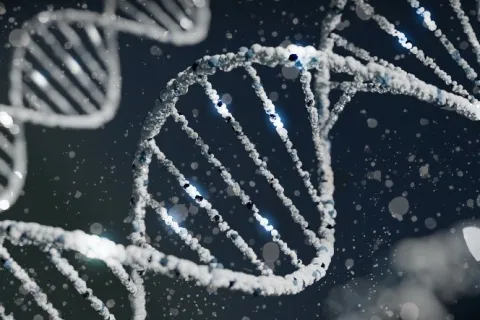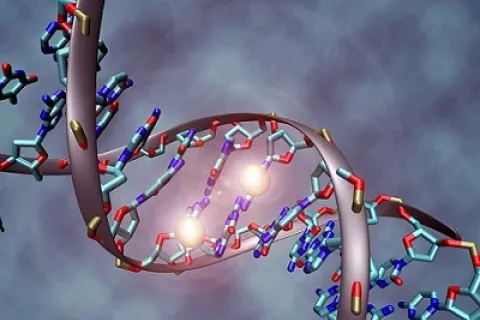Spotlight on the gut bacteria-brain connection in autism
Researchers explore how disruptions in the intestine’s community of digestive bacteria may influence brain development and autism
November 13, 2013Increasingly, scientists are investigating how disruptions in the body’s microbiome– its normal community of healthful bacteria – might disturb brain development and contribute to autism. Deeper understanding may lead to treatments such as probiotics or other therapies that foster a healthy microbiome. The growing interest in this field was reflected by presentations at Neuroscience 2013 this week.
The idea of a gut-brain connection isn’t new. It’s supported by a large body of research showing continuous communication between the bacteria that inhabit the digestive tract and the body’s immune system – and also between the immune system and the brain. A healthy gut microbiome exerts a calming effect on the immune system. In addition, some research suggests that byproducts from harmful gut bacteria can interfere with brain development and function.
“We know clearly that many children with autism have GI problems, but we don't know exactly how those GI disturbances are related to brain function,” comments Paul Wang, Autism Speaks vice president for medical research. “We need to understand the interplay between the gut and the brain so that we can identify the right treatment approaches.”
Early findings from autism’s gut-brain connection
The following Neuroscience 2013 presentations represent early findings from basic research into autism’s gut-brain connection.
Exploring the link between mom’s stress, baby’s gut bacteria & brain development
Previous animal studies have shown that stress during pregnancy increases the risk that offspring will develop autism-like behaviors. Researchers from the University of Pennsylvania Medical School proposed that one pathway from a mother's stress to a child’s brain may be through the gut microbiome.
“At birth, our gut microbiome is initially populated from our mother’s vaginal microbiome as we pass through the birth canal,” explains the study’s lead investigator Christopher Howerton. “Our hypothesis is that mom’s stress during pregnancy can significantly change her vaginal microbiome and this, in turn, alters the baby’s gut microbiome and produces long-term consequences for brain development.” Dr. Howerton works in the lab of Tracy Bale, at the medical school's Center for Research on Reproduction and Women's Health.
To test their idea, Dr. Howerton and his colleagues stressed pregnant mice for the first seven days of pregnancy. Each day they introduced a psychological stress such as the odor of a predator, nighttime noises or nighttime light. Just before birth, they sampled and analyzed the mothers’ vaginal bacteria. Compared to unstressed mothers, the stressed mice had significantly less “good” bacteria such as Lactobacilli.
“When we looked at their pups’ gut microbiome a few days after birth, we saw the same changes there as well,” Dr. Howerton says.
Further analysis associated these bacterial alterations with changes in the pups’ nutrient absorption (gut bacteria help us digest food) and brain development. In particular, the researchers saw abnormal changes in the hypothalamus, the part of the brain that helps regulate response to stress.
Next, the researchers plan to explore interventions such as inoculations of beneficial bacteria to see if this might restore healthy brain development.
Gut bacteria, propionic acid and autism
For more than a decade, Derrick MacFabe and his autism research group at Western Ontario University have been investigating how certain antibiotic-resistant gut bacteria may interfere with brain development and function. These bacteria include Clostridia and other species that produce propionic acid as a waste product. They tend to overgrow in the gut following a course of antibiotics that wipes out other intestinal bacteria.
Dr. MacFabe has published research showing high levels of propionic acid-producing intestinal bacteria in many children with regressive forms of autism. At this year’s Neuroscience 2013, his group presented the preliminary findings of a number of related studies.
In one presentation, they described the early results of a study in which they fed pregnant rats and their offspring diets high in propionic acid. By the time the pups were 4 to 7 weeks old, they showed many autism-like changes in brain development, as well as evidence of intestinal inflammation. Though preliminary, the findings support Dr. MacFabe’s theory that the production of propionic acid and related fatty acids by antibiotic-resistant gut bacteria can increase the risk of autism or worsen its symptoms.
Dr. MacFabe also presented the results from a study looking for biomarkers that could identify children whose autism might be related to propionic acid-producing intestinal bacteria. He and Richard Frye of the University of Arkansas analyzed blood tests from 213 children with autism. They found a pattern of abnormal fatty-acid oxidation products called acylcarnitines. This pattern was similar to that in Dr. MacFabe’s rat model of propionic acid-induced autism.
In both children and rats, the abnormalities were significant enough to interfere with the function of the cell powerhouses known as mitochondria. Mitochondria supply cells with energy. Their healthy function is particularly important in brain cells, which consume large amounts of energy.
Dr. MacFabe’s research and that of others have suggested that mitochondrial dysfunction may be behind some cases of regressive autism. “Acylcarnitines may also be potential biomarkers to identify autistic patients before behavioral symptoms occur,” he says. In addition these potentially harmful chemicals might become targets for new autism therapies, he proposes. The team’s related report recently appeared in the journal Translational Psychiatry.








